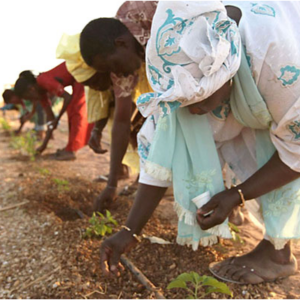 Many Peace Corps posts around the world organized country-specific virtual events to celebrate the day that President Kennedy established the agency. Peace Corps Senegal’s event explored life and service in Senegal — against the backdrop of intensifying climate change impacts.
Many Peace Corps posts around the world organized country-specific virtual events to celebrate the day that President Kennedy established the agency. Peace Corps Senegal’s event explored life and service in Senegal — against the backdrop of intensifying climate change impacts.
By Priyasha Chakravarti
Photo courtesy RPCV Caitlin Healy
In celebration of Peace Corps Week 2023, posts across the world organized country-specific, virtual events, such as Peace Corps Senegal’s “Climate Change and Agriculture in Senegal” panel discussion. Hosted on March 1, the event focused on how Volunteers worked with their counterparts to address agricultural needs and climate challenges — fitting as the month of March is National Agriculture Month. Over seventy percent of the attendees were Returned Peace Corps Volunteers (RPCV) while the remainder were people interested in service in Senegal or in agriculture as a whole. The large RPCV turnout brought an energetic atmosphere to the virtual event, with many of them sharing their Peace Corps experiences in the Zoom chat.
RPCV Anne Reid (Moldova 2016–18, Eswatini 2018–20), a virtual Peace Corps recruiter, opened the event by introducing the first featured guest and Senegal Country Director Jo Anne Yeager Sallah (Senegal 1983–84), who discussed the four different programs that Peace Corps Volunteers address in the country: agriculture, health, economy, and community economic development. Based on their individual interests, many Volunteers take on secondary projects, such as teaching dance and meditation, while dedicating themselves to learning the local language which helps promote intercultural understanding.
“Stepping out of your comfort zone and coming to the Peace Corps requires bravery, but you don’t have to be perfect. Be brave, not perfect. You just have to put yourself out there.”
— Senegal Country Director Jo Anne Yeager Sallah
Yeager also discussed the upcoming opportunities to serve in Senegal along with words of encouragement. “Stepping out of your comfort zone and coming to the Peace Corps requires bravery, but you don’t have to be perfect,” Yeager said. “Be brave, not perfect. You just have to put yourself out there.”
With agriculture playing a crucial role in Senegal’s economy and livelihood, the impacts of climate change can result in decreased crop yield among other adverse environmental impacts. To further explore this topic and the ways Volunteers help address these adverse impacts, Reid introduced El Hadj Bamba Diop, Peace Corps Senegal’s Regional Manager, and Arfang Sékou Sadio, Associate Peace Corps Director of Agriculture and Food Security Coordinator in Senegal.
“Senegal is especially vulnerable to climate change,” Sadio said, noting how flooding, coastal erosion, and desertification impact communities. He stressed the importance of Peace Corps Volunteers’ efforts to supplement existing government strategies for mitigating climate change. As part of their training, Volunteers learn how to engage in soil erosion control techniques, micro gardening, crop diversification, drip irrigation, and more. Equally important is the time they get to integrate with their host community and enjoy good conversations over local food and tea.
Diop described Volunteer life in Senegal as a “unique and exceptional journey, all intertwined in the strong intercultural exchange and experience.” During service, Volunteers connect with their host communities from the beginning and living with their host families plays a huge role in helping ease integration, allowing these relationships to grow stronger over time.
“One of the highlights of my service was working with a woman named Fatu. She had a beautiful flower garden, and I learned a lot about farming and gardening.”
— RPCV Kat Joiner
Also among the featured guest speakers was RPCV Kat Joiner (Senegal 2015–17), who stated her Peace Corps service helped shape her into a more responsible global citizen. With a bachelors in public health and previous experience supporting local farms, Joiner served as an urban agricultural extension agent. She worked in the Master Farmers Program alongside her counterpart, an experienced local farmer, to host trainings that educated the community on agricultural practices, such as companion planting, fruit tree grafting, and garden bed creation. “One of the highlights of my service was working with a woman named Fatu,” Joiner said. “She had a beautiful flower garden, and I learned a lot about farming and gardening.” While working with Fatu, Joiner had the opportunity to learn more about growing flowers and how Fatu organized her business, which helped insert a financial literacy aspect to her service.
While each speaker shared unique elements from their own experience, they all emphasized the importance of supporting sustainable agricultural practices as well as the fight against climate change in Senegal. “The government cannot cover the entire country in terms of action against climate change,” Sadio said. “That is why Peace Corps Volunteers are carrying out activities to adapt to climate change.”
Watch the full recording for the “Climate Change and Agriculture in Senegal” virtual event here.